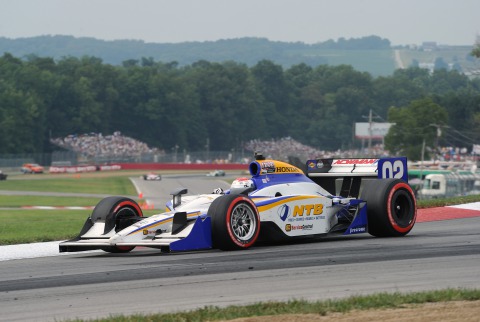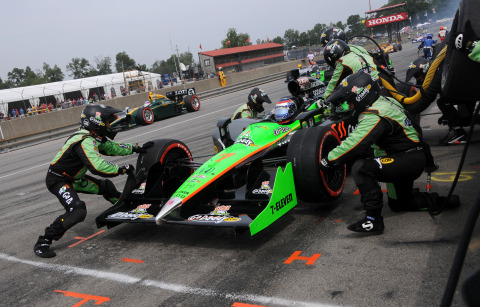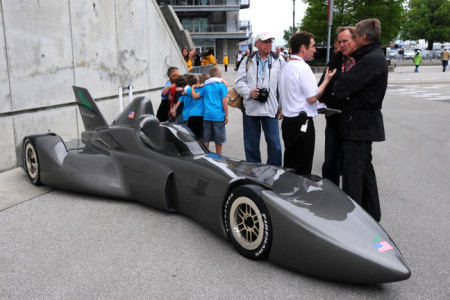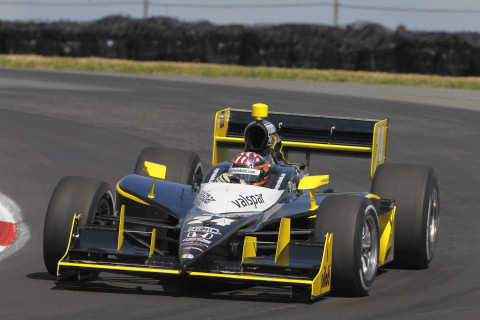The Way It Is/ It's all about the money
by Gordon Kirby Last week's column celebrating Dan Gurney's innovative spirit elicited many admiring responses about the clarity of Gurney's thinking as well as the quality of his character. Dan's experience, intellect and unadulterated passion for motor racing provides him with a unique and lofty view of the sport. Nor should it be forgotten that back in 1964 Car & Driver launched a tongue-in-cheek 'Dan Gurney for President' campaign because Dan represented a charismatically honest contrast to the typical political candidate.
Last week's column celebrating Dan Gurney's innovative spirit elicited many admiring responses about the clarity of Gurney's thinking as well as the quality of his character. Dan's experience, intellect and unadulterated passion for motor racing provides him with a unique and lofty view of the sport. Nor should it be forgotten that back in 1964 Car & Driver launched a tongue-in-cheek 'Dan Gurney for President' campaign because Dan represented a charismatically honest contrast to the typical political candidate.
Remember too, that in 1978 Dan wrote his famous 'white paper' which led to the creation of CART as Dan's thoughtful analysis supplied the team owners with the intellectual rationale for their breakaway from USAC. And of course Dan was the catalyst for the rear-engine revolution at Indianapolis. Back in 1962 Dan drove the only rear-engined car in the 500's field and invited Colin Chapman to the race as his guest. Two months later Dan and Chapman sold Ford on the concept of a lightweight rear-engine Indy car and the rest is history.
So Dan has had a huge impact on the sport in many ways over many years and his thoughts and observations are as relevant today as ever, perhaps even more so. But even Gurney has no solution for the essential problem facing much of American racing today, IndyCar in particular.
As Robbie Buhl recently remarked to me: "This is not a business. None of these teams operate as profitable enterprises."

© LAT USA
Lisles is among many IndyCar engineers and team owners who were big supporters of the Delta Wing concept and were deeply disappointed when the Delta Wing was rejected along with three other contenders for the new Indy car of 2012 in favor of a renewed Dallara-Honda combination. Lisles thinks the 'Iconic' committee did a poor job of making the car selection and believes that IndyCar needs help on many fronts. In particular, he thinks Randy Bernard urgently needs to hire an experienced racing man with plenty of engineering knowledge, a man very like Dan Gurney in fact.
"I applaud the IRL for thinking outside the box and getting a new leader who may or may not be the marketing guru that everybody says he is," Lisles commented. "But unfortunately they only did half the package. They needed the other half--somebody who actually understood motor racing from the inside, its history and how it works. Clearly, marketing is very important, but I think you need somebody alongside you who is smart and knows about motor racing and understands the history and why things are the way they are and what has happened in the past. And I don't see anyone there with those capabilities."
Nor does Lisles think the 'Iconic' committee did a good job of reducing the cost of car and engine.
"As always, it's all about the money and there is a big disconnect between what the series is worth and how much it costs," Lisles observed. "You can't fix it by tackling one aspect. You have to tackle both aspects in a hurry. They've tackled the car, not very well, but they have not done anything and I don't know what they can do to increase the revenue of the teams.
"Certainly, they did not do a very good job at all of reducing the teams' costs. The car is still expensive and the engine is still horrendously expensive compared to what could have been done. It was a pretty half-hearted attempt. The car should be less expensive and the engine should be a half or a third of what they've done the deal for and we should have been tackling the marginal costs too."
Lisles wrote a briefing for the committee about the cost saving in eliminating refuelling, a lesson even Formula One has learned.
"We should not have refuelling," he said. "But the only way you can do that is to have a car that burns a lot less fuel, which was one of the attractions of the Delta Wing. We could have actually had a car that didn't require refuelling.
"That was all in my submission to them about knocking costs out here and there, but they drove blithely past all of it. It was very disappointing. I could have thrown all that refuelling stuff out of my truck. We would have needed one less truck and I wouldn't have to pay for all that equipment and would need that many fewer people."

© LAT USA
"The new car won't make any difference," Lisles declared. "I know that there seems to be a fear in the United States of looking at history and learning lessons from history. But you only have to go back a few years to look at the introduction of the Panoz DP01 which made zero difference to Champ Car.
"And why should it make any difference? The only people who know that the car is different are the people who are already interested in the series. Sure, they're your audience. But they're not enough to sustain the system. You need a much bigger audience. You need to attract the people who don't know about IndyCar racing. From a business point of view, it seems to me that the new car and new engine will make absolutely no difference to the series."
Lisles believes IndyCar would have attracted tremendous media coverage in the testing period and run-up to the Delta Wing's first race.
"The reason a lot of the owners looked very hard at and were supportive of the Delta Wing was because the Delta Wing had the possibility of generating sufficient additional media coverage and interest so that you had a chance of increasing your audience," Lisles observed. "How much wasn't clear, but when you're on life-support you change your priorities for a few extra breaths. Three months of getting those weird, strange Delta Wing cars on TV and in the press could have been enough to kick-start the series or at least move it along a little bit.
"From what I've heard it was the seven to thirteen year-old kids who were really excited by the Delta Wing. And if you get them excited, dad will take them to the race to see it and that's how you build an audience. I understand that everybody was scared to death that the car was different and that you could easily fall on your face. But as I remember, by continuing to do the same thing that's failing and effectively doing nothing but repeating the same failure and expecting a different outcome is considered to be one of the symptoms of madness."
Lisles says he tried to get Ben Bowlby to adopt a fallback compromise solution that might have made the Delta Wing more palatable to those who feared its radicalism.
"I understand why Ben stuck to his guns because it was his baby and he considered the whole thing to be a package," Lisles remarked. "He had got to where he was in a very logical way but I think he probably should've done his presentation and then said, 'If you think it's too much, I can do this. I can put these little narrow front wheels in little aero pods. It won't quite have the efficiency, but if you feel that this is what it takes to get rid of the risk that you're all worried about, then I'll compromise.' But that time has come and gone.
"I tried to get Ben to do that. I talked to him about it last January or February. I asked him how much he would lose with little front wheels and individual aero pods. I said let's at least run the numbers. But he was so focused, and I understand his motivation and desire, but I think Dan Partel should've insisted on a back-up plan. When you do something radical you should always have a go-to plan. But that's easy to say with hindsight."
Lisles is convinced the FIA will adopt some of the Delta Wing's principles in Formula One's 2013 rules. He's equally sure the Delta Wing will never fly.
"There's no going back," Lisles declared. "The door has truly closed. I can't see the FIA getting behind it. They've already taken onboard the efficiency argument of the Delta Wing and Formula One will go that route starting with their new formula in 2013. It probably will be with a more conventional-looking solution. But they will go the Delta Wing route, very much along the lines of what Ben has been saying, and they will sing the praises of what they've done.

© Paull Webb/LAT USA
"The United States was the place to do it because Bernie and the FIA have no hold here. This was the place for it to happen and if you had worked hard and were really ambitious you might have actually threatened Bernie again, like CART did in the nineties."
Lisles also pointed out that in my ladder system column a few weeks ago I failed to emphasize how much influence IndyCar's weak TV ratings and commercial environment has had on America's open-wheel ladder system.
"The reason the feeder series into the upper echelons are not doing very well is because of the change in the economic climate," Lisles said. "It used to be that even the smaller teams in CART and Champ Car were financially viable. They were a genuine business. Of course, they didn't have as much money as the big teams but nevertheless they could pay a driver, not a huge amount, but probably more than most drivers are getting now.
"They couldn't compete for the experienced, top drivers but the natural thing that happened with a lot of the guys coming out of Indy Lights in the nineties was the champion would go and drive for one of the smaller teams who couldn't pay a lot of money but didn't have to take a paying driver.
"Everybody in motor racing wants to win or do well so we all know the driver is the most important part of the equation. Maybe you couldn't afford a Mario Andretti or Michael Andretti or Rick Mears but you could afford that kid who was champion in Lights like Tony Kanaan and Cristiano da Matta.
"Of course, those teams had a pretty good shot at that guy being good for a year or two and if he was good he would move up through the hierarchy of the teams and become more and more desirable and get paid more and more money. But all of that's gone away now. Most of the drivers are getting paid very little, if anything, and drivers who can bring cash to a team, particularly the smaller teams, get the drive."
Perpetually poor TV ratings over many years and weak crowds at most races have drained Indy car racing of commercial value. This indelibly sad fact is at the heart of IndyCar's many problems.
"It's not really a matter of nobody wants an American driver," Lisles added. "The system has stalled because the economics are all screwed up. Motor racing is totally a capitalist sport and normally everybody is on the lookout to get the best for the least. But the normal rules are not applying now because generally in motor racing--and the IRL is an extreme example--the whole thing is on such a bad financial footing currently that none of the normal rules apply that competition would bring.
"So it's not fair to say the teams are all on the lookout for the hot-shot from overseas. The truth of the matter is everyone is struggling to find money and the bringer of gold gets the seat. If the teams were financially viable, that wouldn't be the case.

© LAT USA
Lisles says Newman/Haas would love to test last year's Indy Lights champion J.R. Hildebrand but has no money to fund such a project.
"If we had the money to be able to hire a J.R. Hildebrand or even to go and test him and find out how good he is, we and a number of other teams would do that," Lisles said. "We used to do that quite regularly. But we don't even go testing anymore. We just don't have that kind of money. It's not that nobody is willing or that the feeder system is not working. It's the finances that aren't working, not necessarily the hierarchy of the various formulae.
"The Hildebrands and the Alex Rossis are not being ignored. It's just that they are not an option. The truth of the matter is the IRL is on financial life-support, largely paid for by the owners. If it wasn't for the owners, there wouldn't be a series anymore."
For many decades Europe enjoyed a fabulously clear ladder from Formula Ford and F3 to F2/F3000 to F1, but the FIA allowed all that to evaporate. It was much easier to take the money from a manufacturer or some other entity for one spec-car formula after another. But the sport has paid a price.
"In some ways North America is a lot better place than Europe as far as the open-wheel ladder series," Lisles commented. "There is actually a pretty clear path here in America because there are so few alternatives. You do F2000, then Star Mazda, Indy Lights and then IRL because that's all there is. So it's a pretty clear path, much better than Europe where you have Renault 3.5, GP2, GP3, Formula 3. It's a mess over there. Nobody knows which way to go."
Lisles thinks IndyCar's only way forward is to sell itself as a bargain basement version of F1 with a focus on the American market.
"The only chance we have is that Formula One is so ludicrously expensive that most companies do not have a chance of even getting a decal the size of a cigarette packet on the car," he observed. "A number of those kinds of companies are casting around and for the kind of money for a cigarette packet-sized advert on a Formula One car you can have the better part, if not all of an IRL car for the year.
"That might be the only chance we have of getting some international companies who are used to being in motor racing and say to themselves they can be at the Indy 500 and have the sidepod or the whole car for pretty much what they pay for not very much space at all on a Formula One car. Maybe that's a better solution and it gives them North America to go and exploit. We look pretty good if you come at it from that perspective."
One note of optimism at least, in a very blue world.
Auto Racing ~ Gordon Kirby
Copyright 2010 ~ All Rights Reserved
Copyright 2010 ~ All Rights Reserved
Top of Page